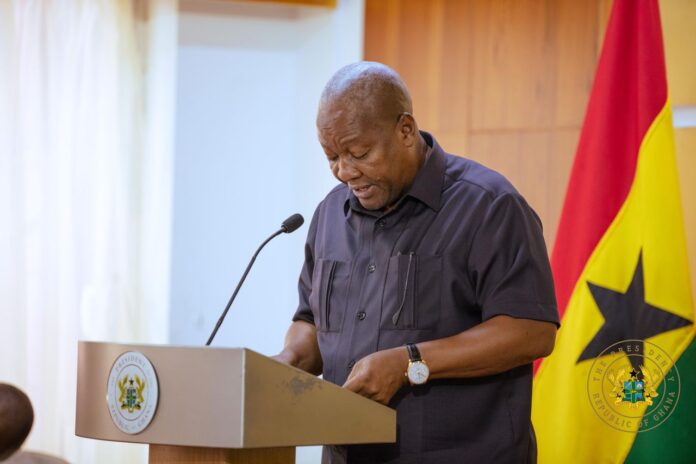In a bold move to transform Ghana’s agricultural sector and reduce the country’s dependence on food imports, President John Dramani Mahama has launched the Feed Ghana Programme — a flagship initiative aimed at revitalising agriculture, with a strategic focus on the tree crops sub-sector, particularly the oil palm industry.
Speaking at the official launch in Techiman, Bono East Region, President Mahama underscored the urgency of boosting local production and tapping into Ghana’s untapped potential in the global oil palm market, which is projected to reach $65 billion by 2027.
“Ghana must take its rightful place in the global oil palm market. With local demand at 450,000 metric tonnes and current production at only 300,000 metric tonnes, we face a shortfall of 150,000 metric tonnes. We must close this gap and seize the opportunity to export,” President Mahama stated.
The Feed Ghana Programme is designed as a comprehensive policy framework to guide all agricultural initiatives under his administration. It places emphasis on modernised farming techniques, infrastructure development, and the establishment of agro-industrial zones across the country.
As part of the intervention, President Mahama announced the introduction of a National Palm Oil Industry Policy, which will offer targeted incentives along the entire value chain — from cultivation to processing and export.
“We call it our ‘brown gold’—palm oil. Through this policy, we will ensure strategic incentives to support farmers, processors, and exporters. Our goal is to turn palm oil into a key economic pillar, just like cocoa once was,” he said.
President Mahama also pledged to strengthen the Tree Crops Development Authority (TCDA), which was established in 2019 by Act 1010 of Parliament to regulate and sustainably develop six strategic crops: oil palm, cashew, mango, coconut, shea, and rubber.
“The TCDA will be given the full support it needs to scale up the development of all six tree crops, but special emphasis will be placed on oil palm due to its high demand both locally and internationally,” he added.
Ghana’s food import bill currently exceeds $2 billion annually. While agro-industries operate below capacity, food inflation, though reduced from a peak of 54% in 2022 to 23%, remains a concern.
“This is not the time for half-measures. Agriculture must not be treated as a development footnote. It is the engine of national transformation, and we must act like it,” President Mahama stressed.
The Feed Ghana Programme, through its Tree Crop Development – Feed the Industry sub-initiative, aims to reposition agriculture as a major driver of economic growth, job creation, and food security.
“It’s time for a collective effort. With this programme, we are not only feeding the people — we are feeding the industries, strengthening our economy, and reclaiming our place in the global agricultural value chain,” President Mahama concluded.
The initiative signals a significant policy shift toward agro-industrialisation, positioning the oil palm industry as a cornerstone of Ghana’s renewed agricultural agenda.

